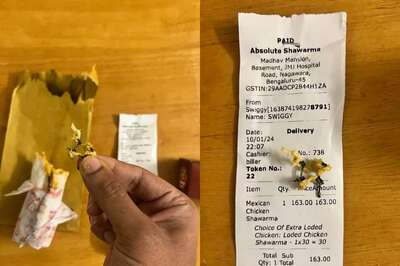
views
Preparing Your Hair

Wash your hair, but skip the conditioner if your hair is fine and straight. You’ll want to have clean hair for your braids, so shampoo as you normally would. However, conditioner can make the hair too silky if it is fine and straight, and silky hair has a hard time holding a curl. If your hair is very coarse and tangled and you absolutely must use some conditioner, use sparingly. It will make a big difference in how well your waves hold.

Dry your hair by gently squeezing out the water. By carefully pressing out the water, you’ll avoid the frizz created from using a normal towel. Scrubbing or wrapping your hair with a towel can roughen the hair shaft and give you a head full of frizz. Wet hair is fragile hair, so be extra gentle whenever you’re working on it. If you can’t squeeze out all the water with your hands, invest in a microfiber towel or use a smooth cotton shirt to dry your hair. You can use these to press out the excess water while avoiding the rough texture of a normal towel.
Comb out your hair and spritz it with a sea salt spray. Use a wide-tooth comb, or just your fingers, to brush your hair out gently. Once it’s combed to your satisfaction, grab a sea salt spray to add some texture to your damp hair. A sea salt spray can give your hair the same waves created by ocean water. Spray the sea salt evenly throughout your hair. The label on the spray will typically say to scrunch your hair afterwards, but the braids will do all the “scrunching” for you. You certainly don't need to run out and purchase a sea salt spray to get perfect waves. Any product that gives your hair some holding power, like mousse or a styling spray for wet hair, will work. You can also use curling cream. These products will also give your hair some added "grit" to help it hold waves. Adding some product may help to prevent frizz, but you can also skip the product completely, if you choose. Braiding wet hair can create gorgeous waves without any sort of spray or mousse, just experiment with your hair to see what works best! If your hair is really tangled after you wash it, apply a detangling product before you comb it out.

Skip the water if you have afro-textured natural hair. Because your hair is naturally more dry, washing it regularly can strip away precious natural oils. Additionally, getting afro-textured hair wet will make it form tighter curls than you want to create. Instead, you may want to create your braids using a moisturizer or oil on dry hair. If you want to start with clean hair, then you can shampoo and condition your hair and follow that up by blow drying your hair while it is in braids. This will create elongated waves when you undo the braids.
Creating Braids

Separate your damp hair into sections. The amount of sections depends on how thick your hair is, and how loose you want your waves. The more hair in a section, the looser your waves will be. If you have very thin hair, you may only need to one or two sections. If you have very thick hair, you might want to separate it into more sections. Clip the hair you are not currently braiding out of the way.

Braid each section of hair. Tight braids will create more of a crimped look, so braid loosely to create soft waves. Remember, wherever the braids start, the waves will start. If you’d like your hair to be smoother at the top of your head and form loose waves around your face, start your braid lower. If you’d like volume and waves at the top, start the braid near the root. Traditional three strand braids work perfectly fine. However, you can experiment with french braids and fishtail braids to see all the different kinds of waves you can create.

Coat afro-textured natural hair with a moisturizing product. You can use any kind of moisturizing, leave-in hair product that you like. Products containing olive oil, coconut oil, shea butter, and glycerin are all good choices. Make sure your hands are lathered in the product as well. Create your braids. Again, you will create different types of waves depending on how tight you braid your hair, and how thick you make your braids. Experiment with different methods until you find the perfect process.

Secure each braid with a hair tie. Try to braid each strand to the very end in order to avoid having pin straight tips when you awaken. Additionally, tying the end of the braid too tightly can create an unsightly indentation in the hair. Secure the elastic firmly enough so that it holds the braid if you toss and turn during the night, but not so tightly that it crushes the strands. Using cloth elastics rather than rubber elastics can help avoid the indent, and also prevent from potential damage. You can skip this step if you have coarse or afro-textured hair because the braids will stay in place without the hair bands. Go to sleep! Your braids will dry overnight.
Drying and Styling Your Waves

Make sure your braids are dry. If you have very thick hair, used big sections of hair, or braided your hair when it was really wet, the braids may be a bit damp when you wake up. If necessary, run a hairdryer over your hair until the excess moisture is gone.

Remove your braids. After you’ve removed all of the hair ties and undone all of the braids, run your fingers through your hair. This will help smooth out the waves and blend the sections back together. Don’t brush your hair! This will just create frizz, and will ruin the waves created by the braids.

Style and spray with hairspray. Aside from brushing, you can style your hair as you normally would. Wear your loose waves down, throw them in a ponytail, or tie them half up, half down. Your waves will add volume to any hairstyle. Once you're satisfied with your hairstyle, spritz your tresses with a hairspray. This will help your waves last throughout the day.




















Comments
0 comment